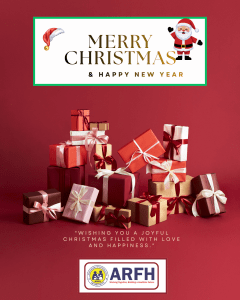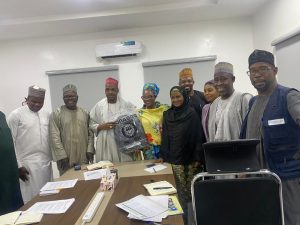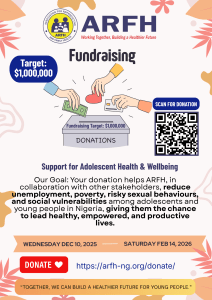 Association for Reproductive and Family Health (ARFH) has recommended the training of reproductive health workers and women’s groups to increase their knowledge of female condoms awareness, at a stakeholders meeting on April 6th 2016.
Association for Reproductive and Family Health (ARFH) has recommended the training of reproductive health workers and women’s groups to increase their knowledge of female condoms awareness, at a stakeholders meeting on April 6th 2016.
ARFH in collaboration with the Federal Ministry of Health (FMoH) with funding support from the United Nations Commission on Life Saving Commodities (UNCOLSC) and Reproductive Health Supplies Coalition (RHSC) through Rutgers, Netherlands, implemented a three and half months grant to improve in-country female condom advocacy.
As part of key activities on the grant, a national stakeholders’ meeting was held to disseminate the findings of the analysis of Reproductive Health and Family Planning policies to include female condoms in their programme priorities.
 47 participants attended from a wide range of organizations in Nigeria that support the strengthening of Reproductive Health and Family Planning services. These organisations included the Federal Ministry of Health (FMoH), Kaduna State Ministry of Health (SMoH), National Primary Health Care Development Agency (NPHCDA), World Health Organisation (WHO), Rutgers, United States Agency for International Development (USAID), Association for Reproductive and Family Health (ARFH), Planned Parenthood Federation of Nigeria (PPFN), Population council, Network of People Living With HIV and Aids (NEPWHAN), Society for Obstetrics and Gynecology of Nigeria (SOGON), Pathfinder International, Jhpiego, Ipas, DKT International, Civil Society for Family Planning in Nigeria (CIS-FP), FHI 360, Wellbeing Foundation, Marie Stopes, and Women Faith Based Organisations namely; Federation of Muslim Women’s Associations in Nigeria (FOMWAN), Sisters in Mission-ECWA church, cradle rockers, Celestial Church of Christ, Women Wing of the Christian Association of Nigeria (WOWICAN), as well as media organisations (ISMPH, Daily Trust and KPPC).
47 participants attended from a wide range of organizations in Nigeria that support the strengthening of Reproductive Health and Family Planning services. These organisations included the Federal Ministry of Health (FMoH), Kaduna State Ministry of Health (SMoH), National Primary Health Care Development Agency (NPHCDA), World Health Organisation (WHO), Rutgers, United States Agency for International Development (USAID), Association for Reproductive and Family Health (ARFH), Planned Parenthood Federation of Nigeria (PPFN), Population council, Network of People Living With HIV and Aids (NEPWHAN), Society for Obstetrics and Gynecology of Nigeria (SOGON), Pathfinder International, Jhpiego, Ipas, DKT International, Civil Society for Family Planning in Nigeria (CIS-FP), FHI 360, Wellbeing Foundation, Marie Stopes, and Women Faith Based Organisations namely; Federation of Muslim Women’s Associations in Nigeria (FOMWAN), Sisters in Mission-ECWA church, cradle rockers, Celestial Church of Christ, Women Wing of the Christian Association of Nigeria (WOWICAN), as well as media organisations (ISMPH, Daily Trust and KPPC).
Prof. Oladapo Ladipo, President/CEO of ARFH, reiterated the need to empower women by making female condoms available, affordable and accessible and emphasized the important roles of all stakeholders present to advancing female condom programming in Nigeria.
Mrs Osinowo, ARFH’s Director of Programmes, presented the recommendations from the analysis, stating that deliberate efforts should be made to train, or build the capacity of frontline health workers to create awareness about female condoms to community members at the grass root. According to the recommendations, strategies for civil society involvement, community engagement and private sector participation to increase community awareness on this issue should be spelt out. Also that health policy makers need to make conscious effort to integrate Female Condoms into existing Reproductive Health, Family Planning and HIV advocacy programmes in Nigeria. The key role of the media (print, electronic, broadcast) and Civil Society Organizations (CSOs) in awareness creation and dissemination of existing Family Planning policies was emphasized.
Participants agreed on the need to engage members and leaders of grassroots organizations such as women’s groups and religious organizations to create awareness of, support and demand for female condoms in Nigeria as the next step for advancing Female Condom programming in the country.
Strong commitments from all stakeholders and participants were made at the end of the meeting, towards support for advancing Female Condom programming in Nigeria.
Association for Reproductive and Family Health (ARFH) is a Non-Governmental Organisation (NGO) in Nigeria with the mission to initiate, implement and promote, in partnership with Government and other organisations, sustainable sexual, reproductive, family and public health information and services for adults and youths.
Download The Brief Report Here: Brief Report Stakeholder Meeting Female Condom Advocacy in Nigeria



